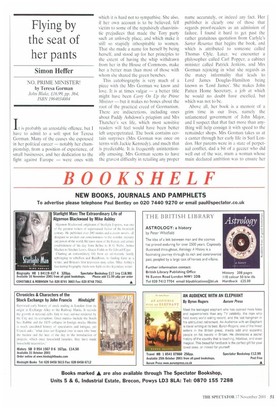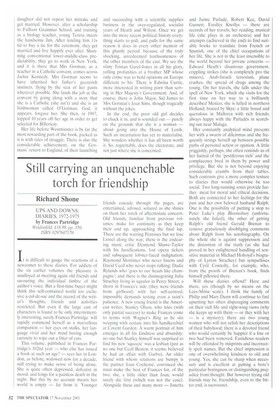Flying by the seat of her pants
Simon Heifer
NO, PRIME MINISTER! by Teresa Gorman John Blake, £16.99, pp. 364, ISBN 1904034004 It is probably an arrestable offence, but I have to admit to a soft spot for Teresa Gorman. Many of the causes she espoused in her political career — notably her championship, from a position of experience, of small businesses, and her dedication to the fight against Europe — were ones with
which it is hard not to sympathise. She also, if her own account is to be believed, fell victim to some of the repulsively chauvinistic prejudices that made the Tory party such an unlovely place, and which make it still so stupidly inhospitable to women. That she made a name for herself by being herself, and stood up for her principles to the extent of having the whip withdrawn from her in the House of Commons, make her a better man than most of those with whom she shared the green benches.
This autobiography is very much of a piece with the Mrs Gorman we know and love. It is at times vulgar — a better title might have been Carry On Up the Prime Minister — but it makes no bones about the root of the practical creed of Gormanism. There are indiscretions, including ones about Paddy Ashdown's priapism and Mrs Thatchers sex life, which most sensitive readers will feel would have been better left unperpetrated. The book contains certain surprises (Mrs Gorman was once on terms with Jackie Kennedy), and much that is predictable. It is frequently unintentionally amusing. Mrs Gorman seems to have the gravest difficulty in retailing any proper name accurately, or indeed any fact. Her publisher is clearly one of those that regards proof-readers as an admission of failure. I found it hard to get past the rather gratuitous quotation from Carlyle's Sartor Resartus that begins the book, and which is attributed to someone called Thomas Clyle. Later, we encounter a philosopher called Carl Popper, a cabinet minister called Patrick Jenkins, and Mrs Gorman rejoicing in what she regards as the matey informality that leads to Lord James Douglas-Hamilton being known as 'Lord James'. She makes John Patten Home Secretary, a job at which he would no doubt have excelled, but which was not to be.
Above all, her book is a memoir of a grim time in our lives, namely the unlamented government of John Major, and I suspect that that fact more than anything will help consign it with speed to the remainder shops. Mrs Gorman takes us at a canter through her early life in Sarf London. Her parents were in a state of perpetual conflict, dad a bit of a geezer who did well out of the war, mum a woman whose main declared ambition was to ensure her daughter did not repeat her mistake and get married. However, after a scholarship to Fulham Grammar School, and training as a biology teacher, young Teresa meets the handsome Jim. After lending him Its 6d to buy a tie for the ceremony, they get married and live happily ever after. Shunning conventional lower-middle-class predictability, they go to work in New York, and it is there that Mrs Gorman, as a teacher in a Catholic convent, comes across Jackie Kennedy. Mrs Gorman seems to have inherited her father's geezerish instincts, flying by the seat of her pants wherever possible. She lands the job at the convent by going along with a story that she is a Catholic (she isn't) and she is an Irishwoman called O'Gorman. God, it appears, forgave her. She then, in 1987, lopped Id years off her age in order to get selected for Billericay.
Her life before Westminster is by far the most rewarding part of the book, packed as it is with tales of struggle. There is also the considerable achievement, on the Gormans' return to England, of their launching and succeeding with a scientific supplies business in the over-regulated, socialist years of Heath and Wilson. Once we get into the more recent political history everything starts to pall, and palls for the same reason it does in every other memoir of this ghastly period: because of the truly shocking, unredeemed loathsomeness of the other members of the cast. We see the slimy Tristan Garel-Jones in all his glory, yelling profanities at a brother MP whose only crime was to hold opinions on Europe different to his. There is Edwina Currie, more interested in writing porn than serving in Her Majesty's Government. And, of course, there is John Major, Sid James to Mrs Gorman's Joan Sims, though tragically without the jokes.
In the end, the poor old girl decides to chuck it in, and is sounded out — purely on the grounds that she is a woman about going into the House of Lords. Such an incarnation has yet to materialise. She wonders whether it has all been worth it. So, regrettably, does the electorate, and not just where she is concerned. and Jaime Parlade, Robert Kee, David Garnett, Eardley Knollys — there are records of her travels, her reading, musical life (she plays in an orchestra) and her attempts (achieved in the end) to find suitable books to translate from French or Spanish, one of the chief occupations of her life. She is not in the least insensible to the world beyond her private concerns — Edward Heath's disastrous government, crippling strikes (she is completely pro the miners), Arab-Israeli terrorism, plane crashes, the spread of drugs among the young. On her travels, she falls under the spell of New York, which she visits for the first time on her way to a brilliantly described Mexico; she is lulled in northern Holland; braced by Skye; a little bored and querulous in Mallorca with rich friends: always happy with the Parlades in scorching sun near Malaga.
Her constantly analytical mind presents her with a swarm of dilemmas and she frequently strings herself up between possible paths of personal action or opinion. A little priggishly, perhaps, she often reminds us of her hatred of the 'pestiferous rich' and the complacency bred in them by power and privilege. But she is not beyond enjoying considerable crumbs from their tables. Such contrasts give a more complex texture to diaries that would otherwise be too social. Two long-running sores provide further meat for moral and ethical decisions. Both are connected to her feelings for the past and her own beloved husband Ralph. One is the possibility of putting a stop to Peter Luke's play Bloomsbury (unfortunately she failed); the other of getting Ralph's old friend Gerald Brenan to remove gratuitously disobliging comments about Ralph from his autobiography. On the whole she is against suppression and the distortion of the truth (as she had proved in her enlightened handling of sensitive material in Michael Holroyd's biography of Lytton Strachey) but sympathises with Cyril Connolly, for example, who, from the proofs of Brenan's book, finds himself pilloried there.
Will these diaries offend? Here and there. yes (though by no means on the Lees-Milne scale). I think the family of Philip and Mary Dunn will continue to find upsetting her often disparaging comments on their rich life and right-wing views (why she keeps up with them — or they with her — is a mystery); there are two young women who will not relish her descriptions of their babyhood; there is a devoted friend who would certainly be happier if a line or two had been removed. Fastidious readers will be offended by misprints and incorrectly spelt names. But the chief impression is one of overwhelming kindness to old and young. Yes, she can be sharp when necessary and is excellent at gutting a bore's particular boringness or distinguishing prejudice from thought. But however trying old friends may be, friendship, even to the bitter end, is sacrosanct.























































































 Previous page
Previous page